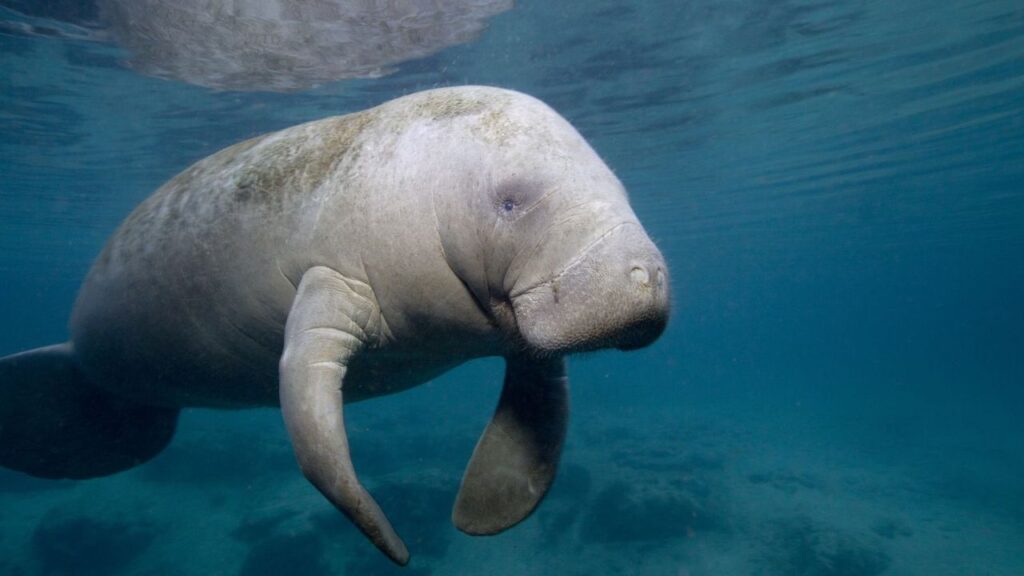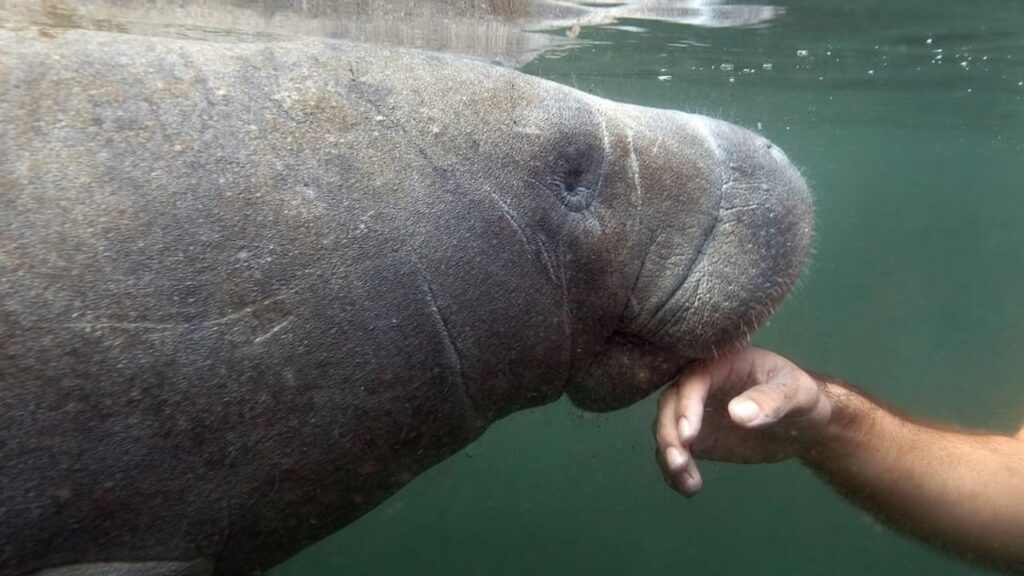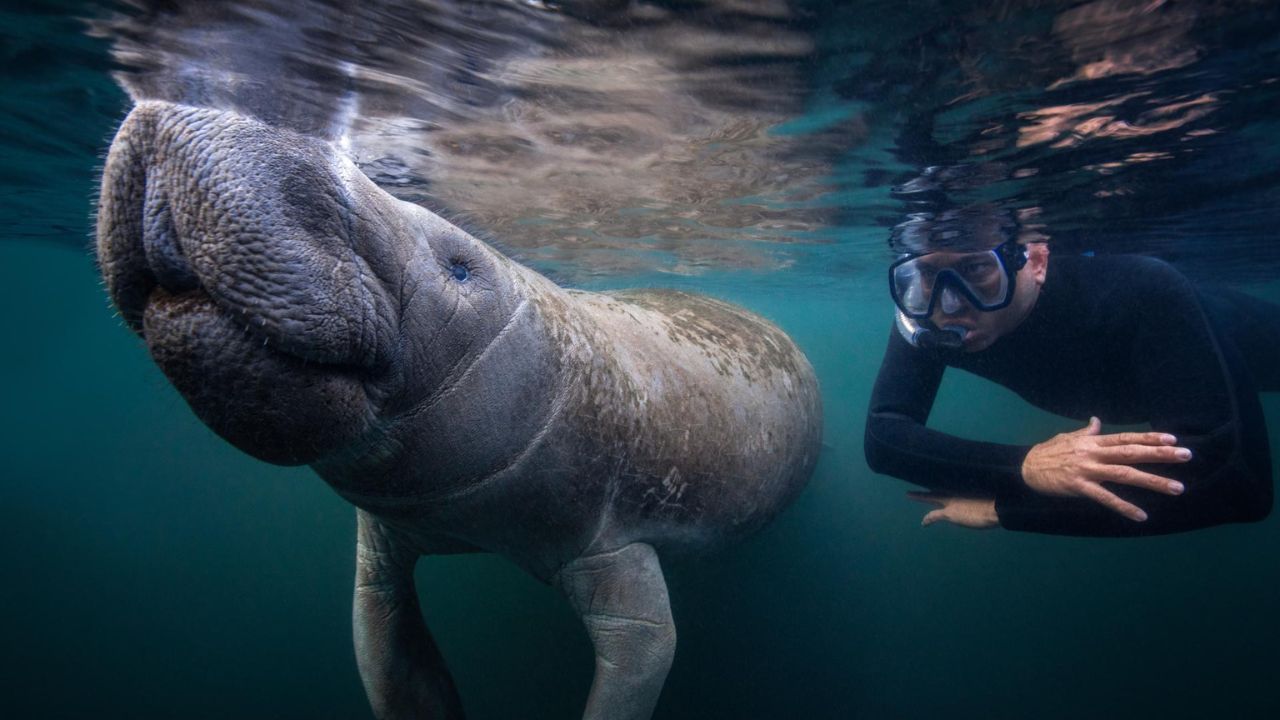Do Manatees Attack Humans? Manatees are gentle, non-aggressive animals and do not attack humans. They are known for their calm demeanor and tend to avoid confrontations.
Manatees, also affectionately called “sea cows,” are large, gentle marine creatures that inhabit the warm, shallow waters of rivers and coastal regions.
Known for their slow movements and peaceful demeanor, these animals often spark curiosity among those who encounter them in the wild.
While manatees are generally beloved for their calm nature, many people still wonder if these massive creatures could pose a threat to humans.
In this comprehensive article, we’ll delve into whether manatees attack humans, explore their behavior, and offer guidelines for safe and respectful interactions.
Contents
What Are Manatees?
Description of Manatees
Manatees are large, aquatic mammals that belong to the order Sirenia. [Do Manatees Attack Humans?]
Often weighing between 800 to 1,300 pounds and growing up to 13 feet in length, manatees have a distinctive appearance, characterized by their round, rotund bodies, short paddle-like flippers, and large, flat tails that propel them through the water.
Unlike more agile marine animals, manatees are relatively slow movers, often drifting through the water at a leisurely pace of around 3 to 5 miles per hour.
Despite their size, manatees are herbivores, feasting almost exclusively on underwater plants like seagrass, algae, and mangrove leaves.
Due to their plant-based diet, they spend most of their day grazing, consuming up to 10% of their body weight in vegetation daily.
Manatees have no natural predators, and their peaceful existence in their watery habitats has earned them a reputation for being one of the gentlest animals in the animal kingdom.
Types of Manatees
There are three main species of manatees, each with distinct geographic ranges:
- West Indian Manatee: This species is the most common and is found along the southeastern U.S. coast, from Florida to the Caribbean and into parts of Central and South America.
- Amazonian Manatee: This species inhabits the freshwater rivers of the Amazon Basin and is smaller than its West Indian relative.
- African Manatee: Found in the coastal and freshwater regions of West Africa, African manatees are similar in size and appearance to the West Indian variety.
Manatees are closely related to dugongs, another marine mammal in the Sirenia order, although dugongs are typically found in the Indo-Pacific region.
Together, these species have survived millions of years, adapting to life in warm, shallow waters. [Do Manatees Attack Humans?]
Do Manatees Attack Humans?
Manatee Behavior
Manatees are often referred to as “gentle giants,” and for good reason. Their slow, peaceful nature makes them one of the least threatening animals in the marine world.
Unlike predators such as sharks or alligators, manatees are not equipped with sharp teeth, claws, or any natural weapons that could pose a danger to humans.
Their primary defense mechanism, if they feel threatened, is to swim away slowly or dive to deeper waters.
Manatees typically swim close to the surface, where they can breathe, and spend their time grazing or resting. [Do Manatees Attack Humans?]
They are known to be curious and may investigate unfamiliar objects or creatures, but they rarely show signs of aggression.
Their placid nature and lack of territorial behavior make them safe for humans to observe, both in the wild and in controlled environments like aquatic reserves.
Interaction with Humans
In regions where manatees and humans frequently interact, such as the Crystal River in Florida, manatees have grown accustomed to human presence. They often approach swimmers, kayakers, or boaters out of curiosity.
However, these encounters are far from aggressive. Manatees may nudge a boat or swimmer gently, but their movements are slow and deliberate, rarely causing harm.
Encounters with manatees are often described as magical or serene, with the animals moving calmly and silently through the water. [Do Manatees Attack Humans?]
Manatees are also known to seek out physical contact from humans in some cases, gently rubbing against divers or allowing themselves to be touched.
While this might seem playful, it’s important to remember that these interactions should be kept minimal to avoid altering the animals’ natural behavior.

Misconceptions About Manatees
Because of their large size, some people assume that manatees might be dangerous, aggressive, or prone to attack if provoked.
This couldn’t be further from the truth. Manatees are non-confrontational creatures and have no history of attacking humans. They are more likely to flee than fight when they feel threatened.
Their primary concern is avoiding harm, as they are much more vulnerable to human activities—especially boating—than people are to them.
In fact, manatees are often victims of human carelessness, with many suffering from injuries caused by boat propellers.
It is not uncommon to spot manatees with scars on their backs from boat strikes. Their calm demeanor and inability to move quickly make them vulnerable in busy waterways, further illustrating their gentle and non-aggressive nature.
Are Manatee Encounters Dangerous?
Accidental Harm
While manatees do not pose a direct threat to humans, their size and weight can result in accidental harm. [Do Manatees Attack Humans?]
For example, a swimmer or snorkeler may find themselves unintentionally bumped by a manatee while sharing the same water space.
However, these instances are rare, and the “collision” is often no more than a gentle nudge due to the animal’s slow movements.
Boaters, on the other hand, should exercise caution in areas where manatees are present. Due to their preference for shallow waters, manatees often swim near the surface, making them susceptible to injury from fast-moving boats.
Boating accidents are one of the leading causes of manatee fatalities, and efforts are made in many areas to protect manatees by enforcing slow-speed zones and designated manatee habitats.
Human-Friendly Nature
Manatees have a reputation for being incredibly docile, which makes them favorites among divers, snorkelers, and nature lovers.
Many people report peaceful, almost tranquil experiences when encountering manatees in the wild. Their slow, relaxed movements and gentle behavior often give the impression that they are as curious about humans as we are about them.
Though manatees occasionally approach humans, they do so out of curiosity rather than aggression. [Do Manatees Attack Humans?]
These interactions should be appreciated and respected, but it is important to remember that manatees are still wild animals and should not be touched or fed, as this can disrupt their natural behaviors.

How to Safely Interact with Manatees
Guidelines for Viewing Manatees
When encountering manatees in the wild, it’s essential to follow specific guidelines to ensure the safety of both the animals and the people interacting with them. Some key tips include:
- Maintain a respectful distance: Stay at least 50 feet away from manatees to avoid disturbing them. If a manatee approaches you, remain calm and allow the animal to move at its own pace.
- Do not chase or harass them: Never pursue a manatee or attempt to force interaction. Manatees should always initiate any contact.
- Avoid feeding or touching: It may be tempting to reach out and touch a manatee, especially when they appear curious. However, feeding or touching manatees is illegal in many places and can alter their natural behaviors.
Best Practices in Manatee Areas
If you’re boating in areas known to be manatee habitats, you must take extra precautions to avoid harming these animals. Some helpful tips include:
- Observe slow-speed zones: Many areas with high manatee populations have designated slow-speed or “no wake” zones to protect manatees from boat strikes. Be mindful of these restrictions and follow local laws.
- Stay vigilant: Keep a lookout for manatees when boating in shallow waters. They often leave visible signs, such as a nose or tail breaking the surface, which can alert you to their presence.
- Be cautious with propellers: If you spot a manatee near your boat, turn off your engine to avoid injuring the animal with your boat’s propeller.
Final Verdict
Manatees are some of the most gentle and peaceful creatures in the ocean, and their interactions with humans are usually calm and uneventful.
There are no known cases of manatees attacking humans, and their natural curiosity often leads to serene encounters in the water.
While their large size can result in accidental bumps or nudges, they pose no real threat to people. [Do Manatees Attack Humans?]
By following guidelines for safe interaction and respecting manatees’ natural habitat, you can enjoy a peaceful and memorable experience with these gentle giants.
See Also: Will Hawks Attack Humans? Shocking Facts!
FAQs
Can manatees be aggressive?
No, manatees are not aggressive. They are known for their calm, peaceful demeanor and have no natural tendencies to attack humans.
Is it safe to swim near manatees?
Yes, it is generally safe to swim near manatees as long as you maintain a respectful distance and avoid disturbing them. [Do Manatees Attack Humans?]
Why do manatees approach humans?
Manatees are naturally curious animals. They may approach humans or boats out of curiosity but do so in a gentle and non-aggressive manner.
Do manatees have natural predators?
Adult manatees have very few natural predators due to their size, though young manatees may occasionally fall prey to sharks or crocodiles. Human activities, such as boating, pose the greatest threat to manatees.
What should you do if you see a manatee while boating?
If you see a manatee while boating, slow down and maintain a safe distance. Be cautious of your boat’s propeller and follow all local speed regulations in manatee zones.
Conclusion: Do Manatees Attack Humans?
In conclusion, manatees are gentle, non-aggressive creatures that pose no danger to humans. [Do Manatees Attack Humans?]
They are often curious and may approach people in the water, but these interactions are peaceful and safe.
While manatees do not attack, it is essential to follow safety guidelines to protect both yourself and these beautiful creatures during encounters.
With proper respect and care, humans and manatees can coexist harmoniously in their shared aquatic environments.

Hello, I am Rosa Ellis, a mother of two and a wildlife blogger. I grew up in New York City, but I love exploring forests. I’ve traveled to places like Yellowstone National Park and the Amazon Rainforest to see animals up close. I know a lot about animal behavior and which animals can be dangerous to humans. Thanks for visiting my blog!

